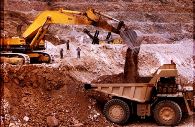
In an attempt to salvage the deteriorating state of affairs, the B S Yeddyurappa government in Karnataka has amended the mining policy and banned export of iron ore from 10 ports in the state.
The government believes that this twin-pronged approach can help it save Karnataka's natural wealth to a large extent. But there are many who do not agree with the government's move.
The mining lords have reacted sharply to the Karnataka government's decision and plan to move the courts against the ban on iron ore export.
The strong mining lobby in the state claims that it is incurring heavy losses due to these measures and has dubbed the move illegal.
Chief Minister B S Yeddyurappa is, however, adamant and says that he will do everything it takes to curb the export of ore as the mining industry has eroded the state's natural wealth.
. . .
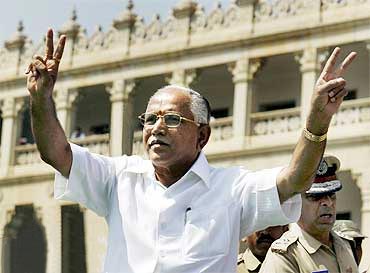
Many people say that had the mining activity in Karnataka, especially in Bellary, been undertaken as per specified norms, things would not have been as bad as they are today. Greed, however, seemed to have thumbed noses as laid-down principles leading to erosion of the state's mineral reserves.
But why is everyone after the iron ore in Bellary, and what is it that led to such a huge demand for it and the subsequent rampant mining? That is the big question.
According to estimates, there is around 1,000 million tonnes of iron ore in Bellary. At the current pace of mining, this ore will last for only 25 years. Experts say that almost 75 per cent of the ore present in Bellary is of a very high quality. It is far superior to the ore found in any other part of the country.
Even as the ore was being mined at a hectic pace, along came the Beijing Olympics. The massive construction activity and infrastructure upgrade that China needed to undertake to showcase its prowess to the world during the grand sporting event led to a huge demand for iron ore, among other things. This huge demand put Bellary firmly in the spotlight.
The sudden spurt in demand for the ore led to everyone wanting to enter into this business and make a quick buck. Some mining lords, who had till then been quarrying and excavating in Andhra Pradesh, decided to turn their attention to Bellary's rich iron reserves and to export ore.
. . .
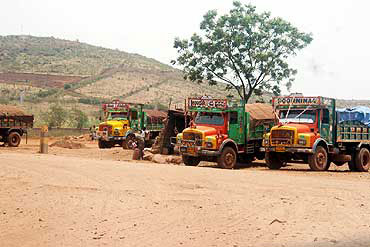
They realised that the ore that was being produced in Andhra Pradesh was not as good as the one that Bellary had to offer. Consider this: a lorry of ore mined in Andhra Pradesh fetched Rs 2,000 as against Rs 5,000-6,000 that the Bellary ore returned.
Officials of the Karnataka government too were largely to blame for this fiasco. The government failed to realise the intrinsic worth of the Bellary ore and was charging a royalty of just Rs 11 for a lorry of ore mined. In other words, Karnataka was literally giving the ore away for free.
The madness for ore in Bellary grew almost twenty-fold and those who were planning to migrate their businesses to Karnataka were given to understand that the government was not giving away new mining permits for another 20 years.
However, the appetite to enter into this business was so voracious that these aspirants entered into contracts through which they could mine in the fields of the existing permit holders. Money and muscle power helped these people open doors to these mines.
Also, it is learnt that the existing mine owners in Bellary were unable to cope with the huge international demand for the ore as they did not have that kind of heavy machinery required to undertake such a huge operation.
. . .
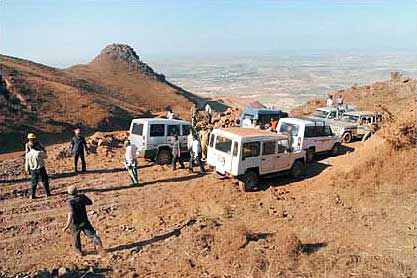
However, with the contractors entering the scene with their money, muscle and machines, this became possible and large-scale extraction of ore commenced.
The ban and its effects
The ban on transportation of ore has already started to have its effects. The mine owners are grumbling no end and say that they are incurring losses of Rs 300 crore (Rs 3 billion) per week. The ban imposed by the state government specifies that no mine owner will be allowed to move ore from any of the mines in the state.
While several mine owners are complying with the ban order, there are many, especially in Sandur near Bellary where the ban is being defied.
Investigations have shown that there are many who continue to ply their trucks with ore and cases are being booked against them. When one of the mine employees was contacted, he claimed that they had not been given any specific directions from their bosses to stop transporting the ore and that "we are just obeying orders".
The opposition Congress party in the state has already turned this into a hot political issue and says that the ban is not effective since powerful mining lords, such as Karnataka Tourism Minister G Janardhan Reddy, continue to operate. The Reddys have, however, denied all wrongdoing and the charges levelled by the Congress. They say that if any of the Congress allegations are proven, they "are ready to hang themselves in public".
. . .
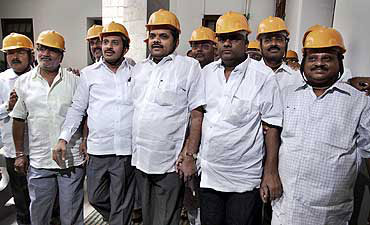
The state government, while imposing the ban, had stated that in the year 2009-10 alone, 8 million tonnes of iron ore had been exported illegally. It said that till date 30 million tonnes of ore has been exported illegally.
Meanwhile, the Federation of Indian Mineral Industries -- which is an exporters' body -- too has expressed its unhappiness with the ban. The miners' body said that not only will it affect several jobs in the industry, but the ban will only encourage illegal mining. People with valid permits may start transporting ore illegally, the FIMI claimed.
Lokayukta Justice Santosh Hegde who is probing the illegal mining scam says that the imposed ban is a step in the right direction. Not only will it save the ore in the state but will also help investigation to a large extent, he said.
"There is no question of movement of ore with this ban. This would mean that we can show how much ore was being sent out prior to the ban which makes it easier for us to put a figure to the entire scam," he said.
He also said that investigations are on and the report would be filed soon.